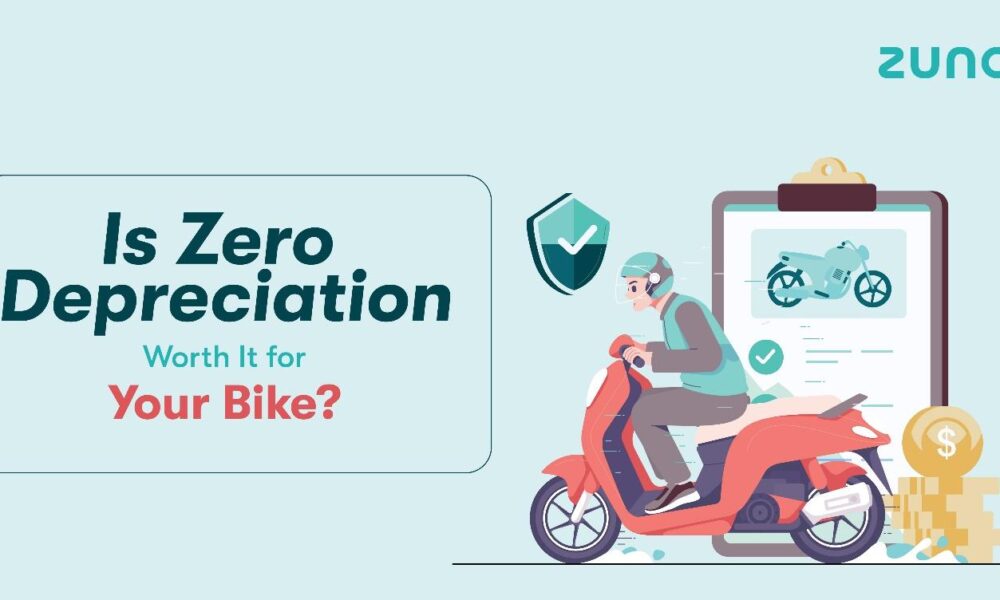Is Zero Depreciation Worth It faor Your Bike?

Here’s a scenario that plays out more often than it should: a rider walks into a garage after a minor accident, insurance papers in hand, expecting the policy to cover everything. Instead, they’re handed a bill because depreciation isn’t just a financial concept, it’s an expense that rides pillion on every claim.
If you own a high-value or relatively new bike, standard insurance can be a frustrating mismatch. It often covers the damage, yes, but not entirely. Plastic parts, fibre components, and even rubber fittings are subject to depreciation. And no, the insurer doesn’t pick up that part of the tab, you do.
This is where zero depreciation bike insurance changes the game.
It’s not a feel-good feature. It’s a numbers-driven decision that ensures you don’t fund depreciation out of your pocket. In this post, we get real about zero depreciation cover, what it actually offers, what it leaves out, and when it makes solid financial sense.
What Is Zero Depreciation Cover?
Also called nil depreciation, this add‑on to a comprehensive two‑wheeler policy ensures that insurers won’t deduct depreciation when settling claims. Instead of writing off ageing plastic, rubber, or fibreglass parts, your insurer would cover the full replacement value, no matter how worn out they are. Think: instead of paying 50% for a tyre replaced pre‑zero‑dep, you pay only the deductible.
Why It Matters for High‑Value and Custom Bikes
For riders with premium or customized bikes, zero depreciation bike insurance isn’t just a luxury, it’s essential.
- High-cost parts, full cover: Customized exhausts, premium suspensions, specialized fiberglass panels these cost a bomb to replace. Zero dep ensures they’re covered in full, not at a fraction.
- Lower out‑of‑pocket costs: Without it, expect insurers to deduct depreciation sometimes up to 50% on plastic components for your share of the bill.
- Peace of mind: Admit it riding doesn’t feel fearless if you’re worried about claim shortfalls. Knowing your bike is fully covered? Priceless.
Quick Comparison Table
What’s Included and What’s Not
✔ Inclusions
- Full coverage for dissipative components: rubber, fibreglass, nylon, plastic
- Complete claim settlement based on IDV (Insured Declared Value)
- Can be added at purchase or renewal
✘ Exclusions and Conditions
- Mechanical wear & tear or breakdown not covered
- Claims for riding under influence or illegal usage voids the benefit
- Battery/tyre damage sometimes excluded check the policy wording
- Only available for bikes up to around 5 years old
When Zero Depreciation Makes Sense
- New(er) or Premium Bikes (≤ 5 years old)
These bikes depreciate fastest, and replacement parts are exotic and expensive. Zero dep helps bridge the claim gap. - Frequent Riders
Hitting the road often hikes the accident risk. A zero dep rider can make multiple claims with minimal cost impact. - Custom or Imported Components
Offbeat add-ons aren’t cheap. With zero dep, you’re not out of pocket for replacing them so riders can stay bold. - Financial Prudence
Let’s face it a slightly higher premium beats dishing out thousands post-claim. One major claim could eliminate the premium difference.
Smart Strategies to Maximise Value
- Check claim limits: Some insurers cap zero depreciation at 1–2 claims per policy year plan accordingly.
- Review exclusions: Battery and tyre coverage, inspection timelines, and usage clauses vary don’t get blindsided.
- Choose the right time: For a 3‑year‑old Royal Enfield, zero dep might still be available and worth it. By year four or five, weigh the math.
Verdict
If the bike in question is less than five years old, fitted with premium or custom parts, or ridden frequently, then opting for zero depreciation cover turns out to be a smart hedge. Yes, the upfront premium is higher but in the long run, it often saves serious cash and hassle post-claim.
In Conclusion
Zero depreciation bike insurance isn’t merely an add-on, it’s a strategic upgrade for riders who want assurance without surprises. It bundles financial security, fuller claim settlements, and peace of mind into one solid policy. So, for those whose bike is more than just transport, zero depreciation is likely not just worth it, but indispensable.




